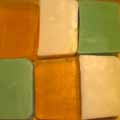Washing Soda for Safe Effective Home Cleaning
Washing soda is an environmentally-friendly natural cleaning product. It is the simple, safe, answer to lots of household cleaning jobs.
Sal soda or sodium carbonate, is an old and valuable solution to many household cleaning tasks. It has been used for many generations, from Napoleonic times even!
It is simple to use and as safe as a chemical can be. So it's a great product to consider as part of your green living kit.
It can be used to clean floors, walls, sinks, drains – in fact almost any surface where you would use a multi-purpose cleaner.
So, what is it?
Also known as sal soda, soda, soda ash and sodium carbonate, it was first created in the laboratory by Nicholas Leblanc a prominent French chemist in the late 18th century.
It is made from common salt and limestone. It is a carbonic acid disodium salt. There are several ways in which it can be produced. Modern production usually involves ammonia and is very efficient ( The Solvay process). The chemical formula is NA2CO3.
It does occur naturally. The Egyptians used a naturally occurring compound rich in washing soda to mummify the dead.
There are also large natural deposits of it in Wyoming, near the Green River.
It is very safe for the environment, breaking down easily and causing no problems.
Used with care, washing soda is a very safe product.
As with any cleaning product, keep it away from where small children might find it.
How safe is it?
Washing soda is quite strongly alkaline so you should not let it be in contact with your skin. Use rubber gloves when dealing with it. It is classed as an irritant and is particularly irritating to the eyes.
You should also avoid breathing the dust. As it is usually supplied as a crystal, this isn’t hard to do. Once it is dissolved in water it doesn't give off toxic fumes.
What's washing soda good for?
- It is very good for dissolving grease and waxy deposits.
- It can be used for getting rid of greasy stains on clothes. It is useful for shifting ink and blood stains and for tea and coffee stains.
- Use it for flushing sinks and drains to get rid of soap scum and grease.
- It will give glass ware up a shiny, lustrous appearance. Tiles and bathroom ceramics come up beautifully clean, too.
- It will help dissolve burnt on grease from kitchen ware.
- If you still use detergent in your washing machine (rather than a laundryball or washball), you can make it go further by adding washing soda. It softens the water, making detergents more effective.
- Use it as a water softener when washing items by hand - preferably use gloves.
- Use it to descale kettles and coffee makers.
- Soda is also useful for removing moss and slime from garden paths. Use it to clean your greenhouse windows, too.
- Soda can also be used in many other more specialised ways e.g. as a fixative in dyeing.
Anywhere you can’t use it?
Don’t use it on aluminium surfaces, waxed or varnished surfaces or fibreglass items. As it is a strong alkaline substance (pH 11) it will cause damage.
It will react strongly with acids, so it is best not to mix them.
I find that it is not so useful for cleaning rags, dishcloths and other materials because it gives them a slimy feel (vinegar is better) though of course you can use it to remove stains and grease before putting them in the washing machine.
How do you use it?
A normal solution is about 1 cupful per litre of water. You can use less than this for washing floors.
For the washing machine, about half a cup placed directly in the drum is effective. Use it 50:50 with ordinary detergent to lessen the amount of phosphates you are adding to the water ways and to make your detergent go further. See Washballs offer cheap green cleaning and Soapnuts for a soft, natural wash for even more cost effective approaches to washing clothes.
Use a stronger solution for drains and burnt pans and for soaking stained clothes: about 1 cupful per 500ml of hot water.
Don’t forget to wear rubber gloves when handling it in case of skin sensitivity.
Where can you buy washing soda?
Buy sal soda where you buy your groceries. It is available in most big supermarkets and some health food shops, hardware shops and drug stores may stock it. You can also buy it from Amazon.
In the UK it usually costs less than a pound for a kilo in the co-op and other supermarkets. Compared to many commercial cleaning products it is quite inexpensive.
This is certainly a natural cleaner that every green healthy home should have! I've used it for years and found no problems at all. It is great because it does so much, so easily and I cannot really think of a downside at all, except perhaps a minor quibble that it can get a bit lumpy if stored in a damp place.
*****
Washing Soda for Safe Effective Home Cleaning - TOP
Natural Household Cleaners
Greenfootsteps Home - for more easy green living ideas
| Tweet |

| Tweet |

Sponsored links
On other pages
Washballs for a Cheap and Effective Washday
Are There Any Safe Chemical Cleaners?

Footprints
- an occasional e-zine from Greenfootsteps
If you would like to receive the e-zine, please just sign up below.






New! Comments
Have your say about what you just read! Leave me a comment in the box below.